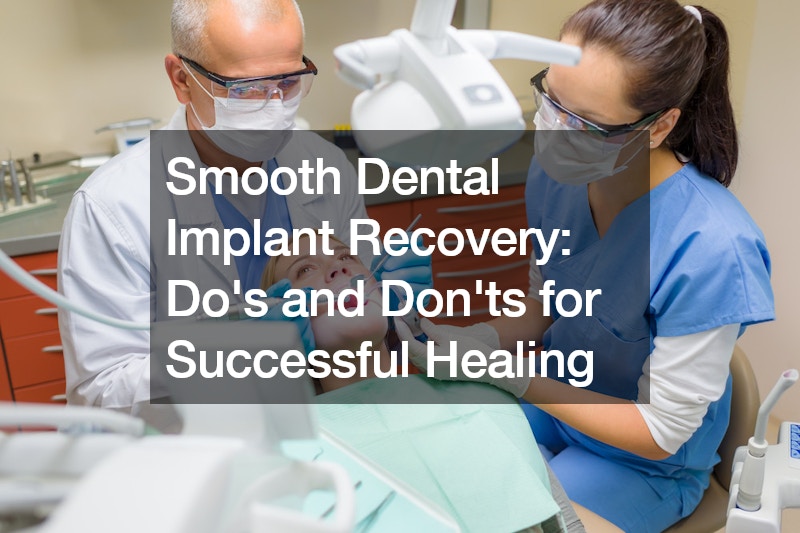
Disclaimer: This website provides health information for educational purposes only and is not a substitute for professional medical advice, diagnosis, or treatment. Always seek the guidance of a qualified healthcare provider with any questions you may have.
Dental implants are a remarkable innovation in dentistry, offering a permanent and natural-looking solution for missing teeth. The surgery itself is a minor procedure, but proper aftercare is crucial for successful healing and ensuring the longevity of your new replacement tooth. Here’s a guide to navigate the first few days after your implant surgery, maximizing your comfort and promoting a smooth recovery.
Rest and Relaxation: The Foundation of Healing
The initial 24-48 hours following surgery are critical for establishing a healthy blood clot at the implant site. This clot plays a vital role in initiating the healing process and integrating the implant with your jawbone. To optimize this process, prioritize rest. Avoid strenuous activities that elevate your heart rate, such as exercise, heavy lifting, or strenuous housework. Take this time to relax, allowing your body to focus its energy on healing.
Temperature Control: Keeping Things Cool
While the temptation might be to soothe post-surgical discomfort with a steaming cup of tea, it’s important to avoid extremes in temperature during the first few days. Hot beverages can cause unwanted bleeding, while very cold drinks can numb the area and make it difficult to gauge healing progress. Opt for lukewarm or room-temperature liquids and stick to a lukewarm saltwater rinse for gentle cleaning.
Say No to Suction: Avoiding Dislodgement
The act of sucking can dislodge the delicate blood clot at the implant site, potentially leading to complications. This includes smoking, using a straw, and even spitting vigorously. If you experience excess saliva or blood in your mouth during the initial healing phase, simply tilt your head forward and let it drain naturally.
Hands Off: Minimizing Disruption
Your mouth is a breeding ground for bacteria, and the surgical site is particularly vulnerable during healing. Refrain from touching the implant area with your fingers or tongue. This poking and prodding can disrupt the healing process and introduce bacteria, potentially leading to infection. Let the implant heal undisturbed.
Antibiotics: Your Allies in the Fight Against Infection
Following your dentist’s instructions for antibiotic medication is crucial. These medications help prevent infection, a potential complication after any surgery. Take the full course of antibiotics as prescribed, even if you start to feel better before finishing the entire dosage.
Diet Do’s and Don’ts: Soft Food is Your Friend
For the first few days after surgery, stick to a diet comprising soft foods that are effortless to chew and swallow. Opt for mashed potatoes, yogurt, applesauce, and softly cooked vegetables as they are ideal choices. Steer clear of hard, crunchy, or sticky foods that may exert pressure on the implant site or disrupt the sutures. This encompasses nuts, seeds, raw vegetables, and hard candies.
Gentle Cleansing: Maintaining Oral Hygiene
While maintaining good oral hygiene is essential after surgery, brushing and flossing around the implant site require a delicate touch. Use a soft-bristled toothbrush and gentle brushing motions, avoiding direct contact with the implant itself. Consider using an antibacterial mouthwash as directed by your dentist to help control bacteria and promote healing.
Bleeding and Discomfort: What to Expect
It’s typical to experience slight bleeding and swelling following dental implant surgery. To reduce swelling, use a cold compress on the outer cheek near the implant area for 15 minutes at a time, with intervals in between. Over-the-counter pain medications can also alleviate any discomfort. If you notice unusually heavy bleeding or persistent pain that doesn’t improve after a few days, it’s important to reach out to your dentist promptly.
Follow-Up Appointments: Maintaining the Course
Your dentist will likely schedule follow-up appointments within the first few days after surgery to monitor your healing progress and address any concerns you may have. These appointments are crucial for ensuring a smooth recovery and a successful outcome. Don’t hesitate to ask questions during your follow-up visit to address any lingering doubts or concerns.
Additional Tips for a Smooth Recovery
- Elevate your head while sleeping: This can help reduce swelling in the surgical area.
- Get enough sleep: Adequate sleep allows your body to focus its energy on healing.
- Avoid alcohol: Alcohol can interfere with healing and may increase bleeding.
- Consider using a saltwater rinse: A gentle saltwater rinse can help remove food particles and promote healing. Mix a teaspoon of table salt in a cup of warm water and rinse gently after meals.
Conclusion: A Rewarding Journey
Following these do’s and don’ts will set you on the path for a smooth and successful recovery from dental implant surgery. Remember, a little patience and following your dentist’s instructions will ensure your new replacement tooth integrates seamlessly into your smile, allowing you to enjoy the benefits of a complete and functional smile for years to come.
.
